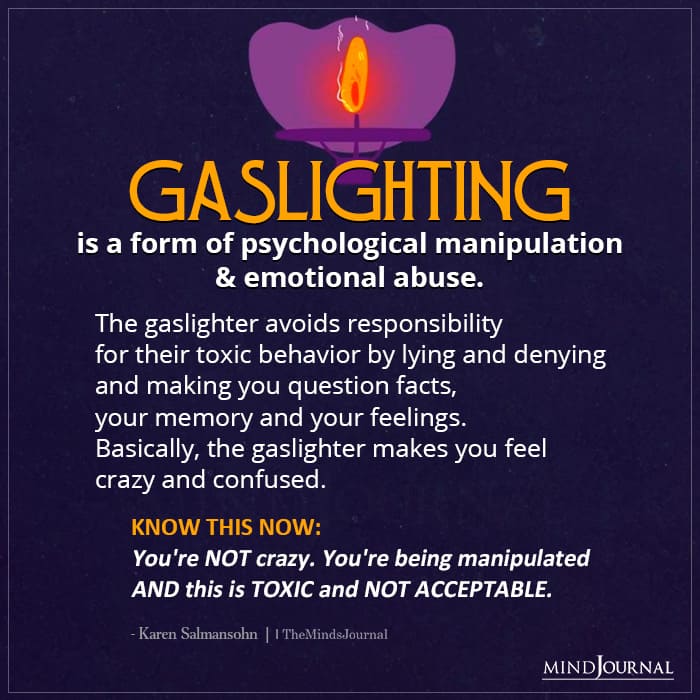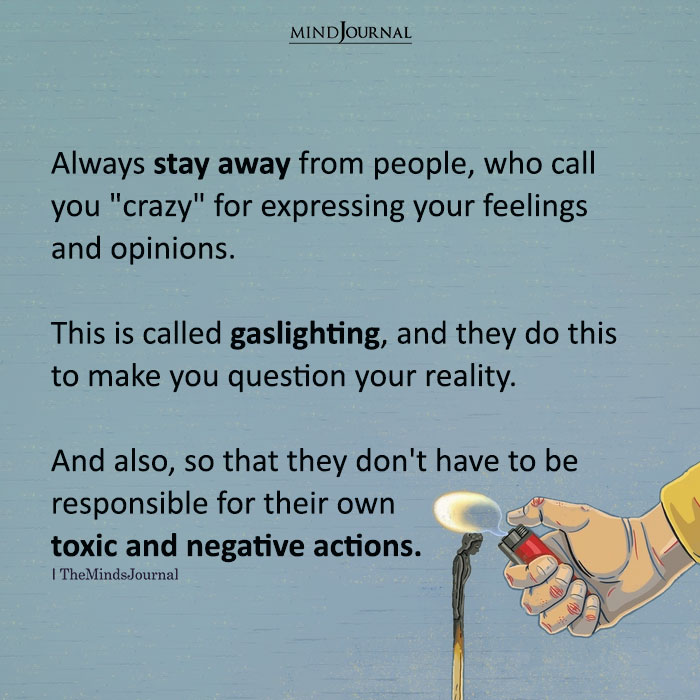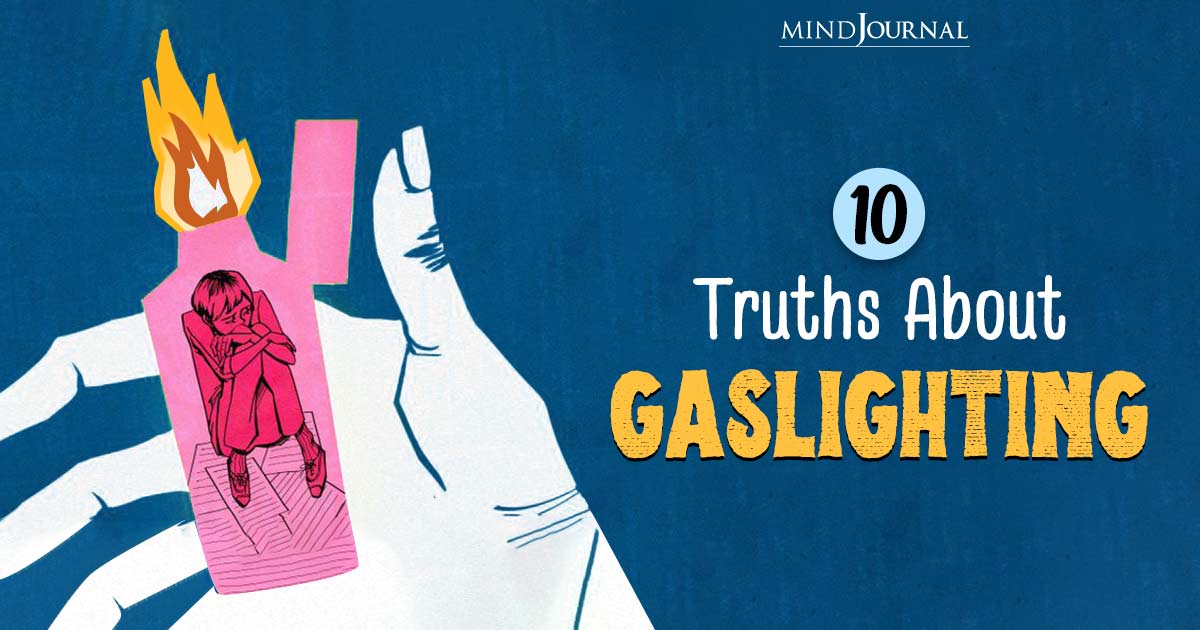Don’t let someone else’s twisted version become your truth, stand up for your reality. Learn the truth about gaslighting before it’s too late.
Ever felt like you’re losing your grip on reality? Like everything you thought was true is being twisted and turned against you? If so, you may have experienced gaslighting – a sinister tactic used by some to overwrite your perception of the world.
It’s a dangerous game, and one that’s hard to escape from alone. But fear not, because you’re not alone. And with a little knowledge and understanding, you can break free from the grip of gaslighting and reclaim your reality.
Here are the 10 things I wish I knew about gaslighting before it happened to me…
Truth About Gaslighting: 10 Things I Wish I Knew About Gaslighting
1. Gaslighting can be unintentional but still damaging
Gaslighting is a term that’s thrown around a lot these days, but what does it actually mean? Contrary to popular belief, it doesn’t necessarily involve a deliberate scheme to make someone feel crazy.
It’s simply the act of denying someone’s reality in favor of your own. Gaslighting tends to happen when intimidation no longer works, and is often used as a means of control in situations where violence is no longer acceptable.
We see it all the time in the media, when hate crimes are portrayed as isolated incidents of mental illness. This is just one example of how our society tries to preserve inequality while pretending everyone is equal.
So, the next time someone tries to make you doubt your own reality, remember: gaslighting is a real thing, and it’s happening more often than you might think.
Read Gaslighting: 7 Warning Signs He’s Psychologically Manipulating You
2. Manipulation and gaslighting: same but not same
One of the 10 things i’ve learned about gaslighting is that, while manipulation and gaslighting are similar, gaslighting takes it to a whole new level.

Manipulation involves threatening someone to influence their behavior, while gaslighting aims to change who the person is at their core, not just their actions.
Here’s the kicker: both manipulation and gaslighting can chip away at your self-esteem, but gaslighting is especially insidious because it can make you doubt your own reality.
So, it’s important to understand the difference between the two and protect yourself accordingly.
3. Gaslighting without anger or intimidation: a subtle danger
In fact, there are different types of gaslighting that can leave you feeling confused and hollow. One type is called “glamor gaslighting”.
In this the gaslighter showers you with special attention but never really gives you what you need. They put you on a pedestal, but then disappear when you need them most.
Another type is when the gaslighter always plays the victim and turns the tables on you whenever you bring up a problem.
Personally, I’ve experienced the worst kind of gaslighting where I’d say something to him and he’d have an over-the-top emotional reaction.
I’d backtrack and try to make things better, but he’d accuse me of being inconsistent and imply that I was lying. It was a never-ending cycle that always left me in tears.
Remember, gaslighting is a serious form of emotional abuse that can leave lasting damage. Trust your instincts and seek help if you suspect you’re a victim of gaslighting. Don’t let anyone manipulate your reality and make you question your sanity.
4. Memory lapses are normal, gaslighting-induced amnesia is not
Did you know that it’s normal to not remember what happened during a traumatic experience? Yeah, it’s not just you.
What I wish I knew about gaslighting sooner is that it can cause self-doubt and guilt.
But here’s the thing, losing parts of your memory is a common sign of gaslighting. It’s a tool used by abusers to make you doubt yourself and question your own reality. I’ve spent so much time trying to find what my abuser saw in me, but it turns out, he was just manipulating me.
So, if you’re experiencing black spots in your memory, it’s time to pay attention. It might be a sign that you’re being gaslighted and it’s time to leave.
Read 15 Signs You’re A Victim Of Gaslighting
5. Stages of gaslighting persist beyond the relationship’s expiry date
The truth about gaslighting is that it doesn’t just end when the relationship is over. Oh no, it can continue to mess with your head even after you’ve walked away.
It starts with Stage One – you know your gaslighter is being ridiculous, but you argue with them anyways. You argue over everything, from your feelings to your opinions to your experience of the world.
In Stage Two of gaslighting, things take a dark turn. You find yourself prioritizing your gaslighter’s perspective, frantically trying to make them understand yours. Winning the argument isn’t about being correct anymore – it’s about proving your worth as a person.
By Stage Three, you’re totally messed up. You’re asking yourself, “What’s wrong with me?” and considering your gaslighter’s perspective as normal. You’re losing your ability to make your own judgments.
Go no contact for at least a year. Yes, it’s hard, but you need to give yourself space to heal. Block your gaslighter on social media, distance yourself from mutual friends, and ask your friends not to give you any new info about them.
6. Vulnerability to gaslighting can be a strength in disguise
Among the 10 things i wish i knew about gaslighting is that it can be tough, especially when you have certain traits that make you more susceptible.
But don’t let anyone tell you that these traits are weaknesses. They’re actually superpowers! Traits like empathy, are amazing qualities that make you unique and special.
Your gaslighter might have made you feel like you were selfish or cruel. And maybe your therapist even told you to stop caring so much because it leads to abuse. But that’s not the answer.
Empathy is crucial, and the ability to change yourself for the better is a freaking superpower. Don’t let anyone shame you or make you afraid to change. Growth can be painful, but it should make you feel stronger.
The pain of growth is different than the pain of destruction. One fills you with love and pride, while the other fills you with shame and fear.
No one should try to control you with shame and fear. Remember, change should make you bigger and better, not smaller and weaker.
7. Trust your truth: it’s always been within you
Do you ever feel like you’re living in the shadows, invisible to the person who’s supposed to love and cherish you?
Your gaslighter might shower you with affection, but they don’t really see you. They don’t see the real you, the person you know yourself to be deep down.

But here’s the thing: you’ve always known your truth. You might have tried to push it aside, but it’s been there all along. Even when your mind was in knots and you felt lost, that core part of you was always there.
Think of it like an alarm system that never stopped working, even when you stopped listening to it. You might feel like you’ve lost a part of yourself, but really, it’s just been waiting for you to acknowledge it.
So don’t let your gaslighter make you doubt your truth!
8. Don’t engage: the ultimate goal of gaslighting recovery
Among the top ten things about gaslighting, the ultimate goal is not confrontation, it’s non-engagement.
In movies and books, survivors often confront their abusers, finding catharsis in standing up to their oppressors. But for many of us, the fear of confrontation can be paralyzing. The key to overcoming this fear lies in our ability to set and enforce our own boundaries.
When you engage with gaslighters, you are essentially telling them that your reality is up for debate. But it’s not. So instead of rehearsing conversations that will never happen, you need to learn how to identify the objective of a conversation.
You can disengage in many ways, from agreeing to disagree to setting boundaries about when or if you want to continue the conversation. You don’t have to figure out what the other person is doing or why they’re doing it.
All you need to know is what you’re feeling and when the conversation is no longer about mutual understanding.
The minute someone tries to replace your experience with their own, it’s time to disengage. Your reality is yours alone, and you should never let anyone take that away from you.
9. Confrontation is necessary for overcoming gaslighting
To confront gaslighting, you must confront the threats that come with it. Every gaslighting situation has some kind of threat looming over you. It could be disapproval, abandonment, or even physical harm.
You can’t resist gaslighting until you confront your fears head-on. Take a moment to grieve and cry over the things that made you feel trapped. It’s okay to feel ashamed, but try to build up the strength to hold it.
Start by letting go of the attachments that keep you tied down. Grieve the things you wanted but couldn’t have. Question whether it’s right for someone to make you responsible for their life.
It won’t be easy, but as you confront each fear, you’ll find the strength to keep going.
10. Gaslighting thrives in groups: from families to polyamorous relationships
It’s tough to hold your ground when someone is trying to distort your reality. And it’s even harder when they have a posse of supporters backing them up. Cult abuse is a prime example of how group manipulation can completely break someone down.
That’s why it’s crucial to be mindful of this in family, polyamorous relationships, and any other groups. You don’t want to exploit this power dynamic or inadvertently enable abuse.
Shame and fear come with being attacked by a group you’re deeply invested in. But you owe it to yourself to not tolerate relationships where your self-worth is being eroded.
It doesn’t matter whose fault it is, and it’s not about fairness. What’s at stake is far more significant.
Read 8 Lies You Start Believing When An Abusive Partner Is Gaslighting You
So among the top ten things about gaslighting, which truth did you relate? Share your story and the truth about gaslighting in the comments below!
For more information on gaslighting, or to get support if you or someone you know is being abused, visit the National Domestic Violence Hotline or call 1-800-799-7233.












Leave a Reply